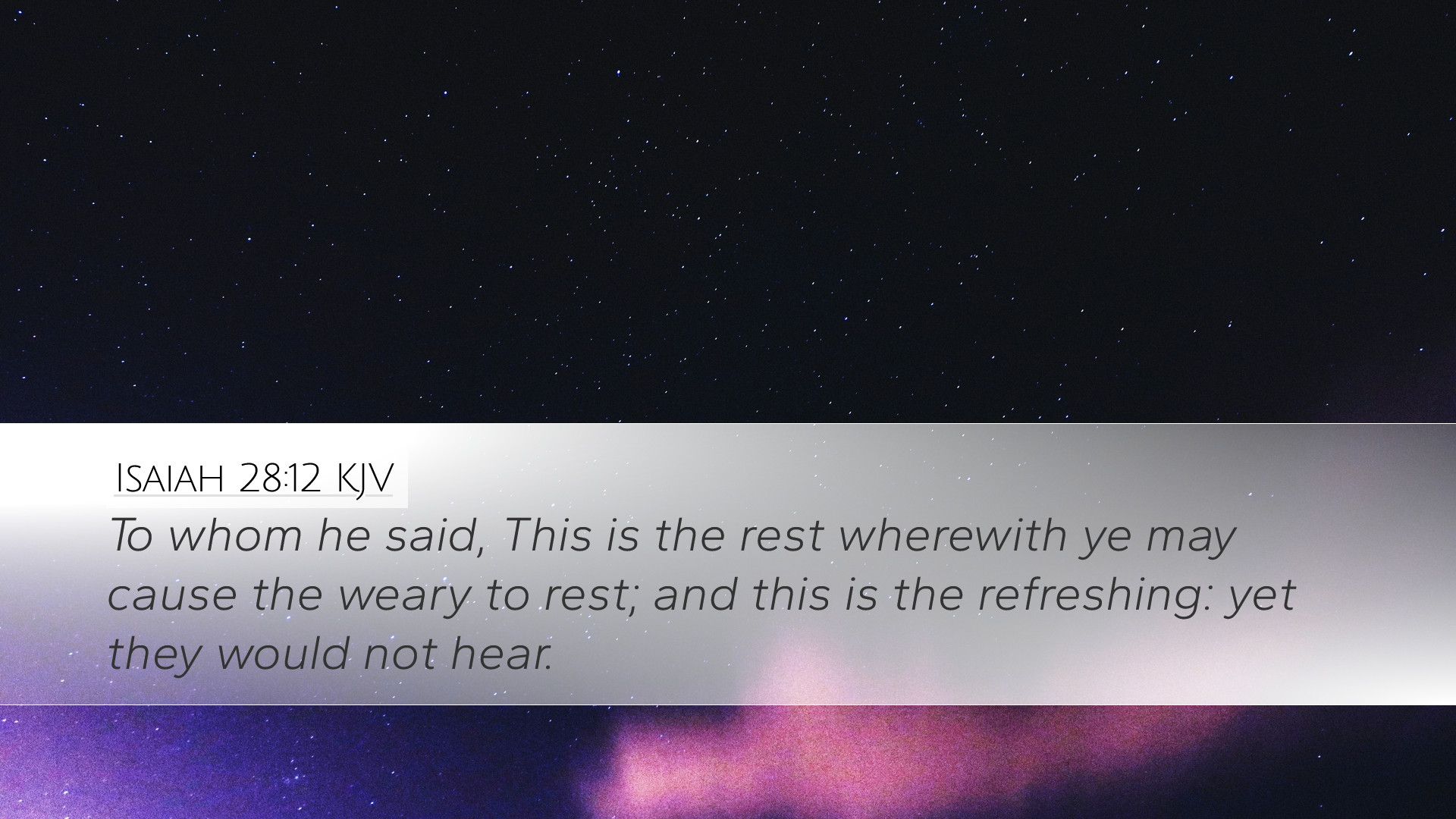Commentary on Isaiah 28:12
Bible Verse: Isaiah 28:12 - "To whom He said, ‘This is the rest with which you may cause the weary to rest,’ and, ‘This is the refreshing;’ yet they would not hear."
Contextual Overview
This verse is situated within a broader prophetic message directed at the people of Israel, particularly focusing on the leaders of Ephraim and Jerusalem. It emphasizes their failure to heed God’s offer of rest and refreshment, representing spiritual rejuvenation. Scholars agree this reflects God's desire for His people to experience peace and comfort amidst their tumultuous circumstances.
Matthew Henry's Insights
Matthew Henry highlights that this passage illustrates God's merciful invitation to His people. Despite their rebellion and deafness to His word, God continues to extend His grace:
- The Offer of Rest: Henry notes that the "rest" referred to is not merely physical but spiritual. It is an invitation to find solace in God's presence during times of distress.
- The Refreshing: He emphasizes that true refreshment comes from obedience to God’s commandments and trusting in His promises.
- Human Inattention: Henry poignantly observes that the refusal of the people to listen to God reflects a tragic human condition; they preferred their own ways over divine counsel.
Albert Barnes' Commentary
Albert Barnes offers a more contextual and theological perspective on this verse:
- The Context of Judgment: Barnes points out that this message follows a warning against drunkenness and moral decay among the leaders. The "rest" is contrasted with their chaotic state.
- God’s Assurance: He interprets "rest" as God’s promise of peace, and that the refreshing comes through true repentance and a return to God’s will.
- Rejection of Offer: Barnes reflects on the sadness of God’s sentiment, noting that their refusal is not just physical but spiritual disinclination to acknowledge God's mighty provision.
Adam Clarke's Perspective
Adam Clarke provides a detailed exposition of the text, making several critical observations:
- The Nature of Divine Rest: Clarke emphasizes that God’s rest signifies a state of tranquility that comes with trusting in Him, which the people were missing out on due to their indifference.
- Subsequent Disobedience: He draws attention to the grave consequences that arise from the refusal to accept God's invitation; this leads to further disobedience and spiritual dryness.
- Lamentation over Rejection: Clarke reflects on God's grieving over His people's unwillingness, imparting the depth of divine longing for reconciliation with humanity.
Theological Implications
This verse serves as a profound reminder for pastors and theologians of the dual nature of God's word as both an invitation to find peace and a call to accountability. The rejection of divine advice leads not only to personal turmoil but also to communal consequences.
Practical Applications
For a modern audience, Isaiah 28:12 urges believers to reflect on several practical aspects:
- Listening to God: Diligently seek the word of God and be intentional in discerning His voice amidst the clamor of the world.
- Embracing Rest: Accept God's offer of spiritual rest as a remedy for life's weariness, learning to practice spiritual disciplines that cultivate peace.
- Responsive Leadership: Church leaders should foster environments where individuals are encouraged to rest in God’s promises, demonstrating compassion and understanding toward the weary.
Conclusion
Isaiah 28:12 stands as a timeless message of hope and warning, inviting both individual and corporate reflection. The Holy Spirit continues to urge believers towards a heartfelt responsiveness to God’s promise of rest, a call that transcends generations and speaks poignantly into our contemporary context.


